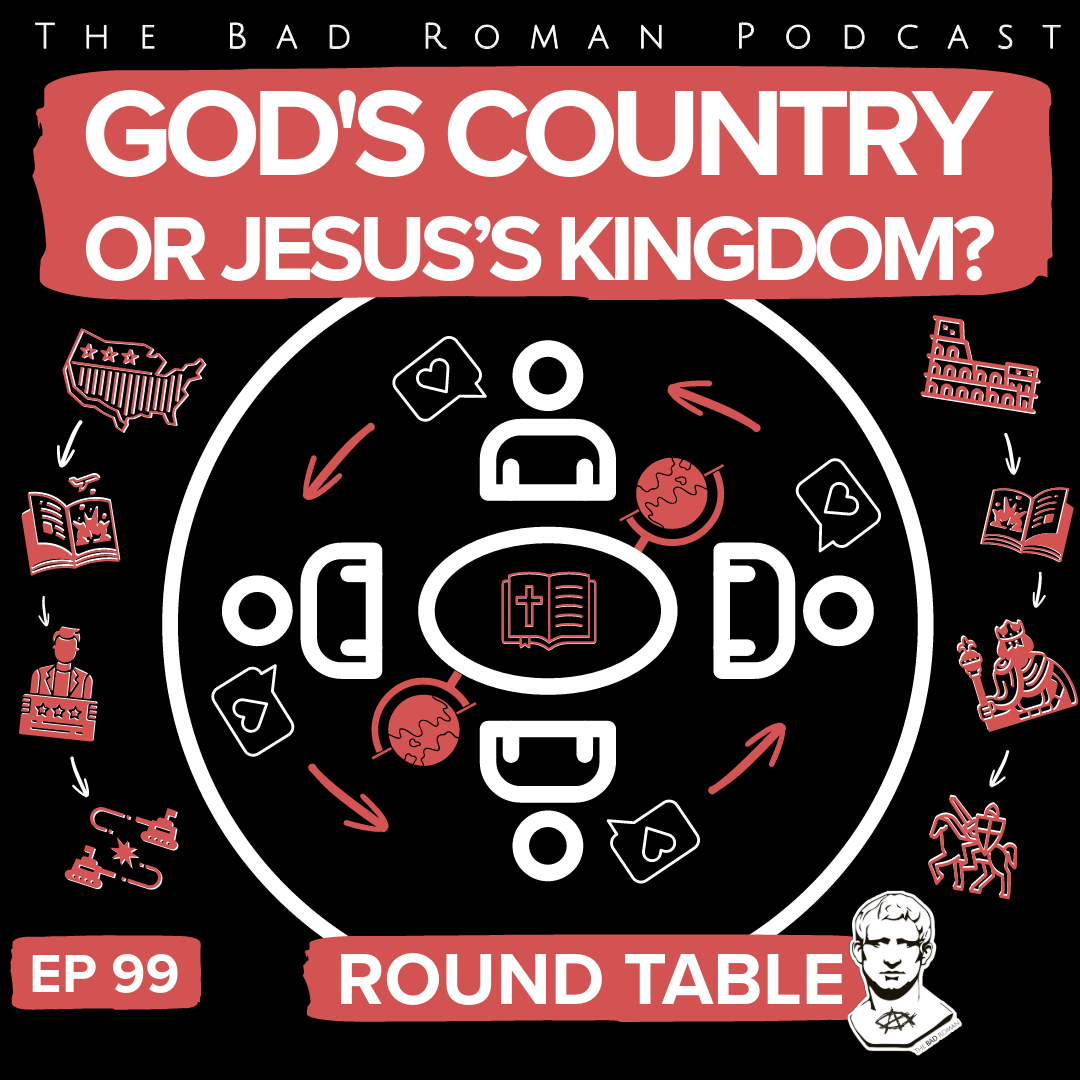Are we silencing half the Body of Christ?
For centuries, churches have taught that men lead while women serve quietly in the background. But what if this isn’t God’s design at all? What if the church has been hobbling along on one leg, because we’ve sidelined half the image of God?
This is the heart of our latest Bad Roman conversation with biblical teacher Matt Mouzakis, who joins Craig to revisit the creation story, Paul’s letters, and the witness of the early church. Together, they ask: Did Jesus and the apostles intend women to lead, teach, and shepherd alongside men? Spoiler: the resurrection was first preached by women, and that was no accident.
The Genesis Misread
We’ve often heard that Eve was created from Adam’s “rib,” a secondary helper. But the Hebrew word tsēlāʿ is better translated as side, not rib (Exodus 25:12). Eve was not a spare part—she was Adam’s other half.
Likewise, ʿēzer kenegdo (often rendered “helper suitable”) is the same word used for God as Israel’s strong ally (Psalm 121). Far from denoting subordination, the text paints Adam and Eve as co-priests in Eden, tasked with stewarding creation together.
Paul in Context: 1 Timothy 2
One of the most-cited passages against women in ministry is 1 Timothy 2. But the Greek words tell a different story:
Epitrepo (commonly translated “permit”) is a situational allowance, not an eternal decree.
Authentein (usually rendered “exercise authority”) means to usurp or domineer, not healthy spiritual leadership.
In context, Paul was addressing a crisis of false teaching in Ephesus (1 Timothy 1:3–7), not issuing a permanent ban. His real command? “Let the women learn.” In the first-century world, that was radical.
The Corinthian Puzzle
Another stumbling block is 1 Corinthians 14:34–35, where Paul seems to demand women be silent. But some manuscripts omit these verses entirely, while others move them around — suggesting they may have been a marginal scribal note later copied into the text.
And even if we keep them, they cannot override Paul’s instructions in 1 Corinthians 11, where he expects women to pray and prophesy in the gathered assembly.
What “Headship” Really Means
When Paul says “the husband is the head of the wife,” he uses the Greek word kephalē. In English, “head” often implies boss. But in Greek, kephalē more commonly means source or lifeline.
If we read kephalē as hierarchy, we run into theological problems—because Paul also says “the head of Christ is God” (1 Cor 11:3). That doesn’t make the Son less divine. Instead, it emphasizes relationship and origin.
In Ephesians 5, Paul doubles down: Christ is the “savior of the body,” not its tyrant. Husbands are called to love their wives as Christ loved the church—through self-sacrifice, not domination.
Women Who Led Anyway
The witness of scripture itself contradicts the idea of silenced women:
Junia, “outstanding among the apostles” (Romans 16:7)
Priscilla, who taught Apollos (Acts 18:26)
Phoebe, deacon, patron, and first carrier of Romans (Romans 16:1–2)
Deborah, prophet and judge (Judges 4–5)
Huldah, prophet consulted by King Josiah (2 Kings 22)
The receipts are in the text—and in history.
Why This Matters (Kingdom over Empire)
If “No King but Christ” is more than a slogan, then His Kingdom must shape how we live and lead. Genesis 3’s “he will rule over you” was a diagnosis of the Fall, not God’s ideal. In Jesus, that curse is undone.
The church should be the first place where we refuse to sideline half the image of God.
3 Ways Churches Can Honor the Full Image of God
Re-examine the texts honestly: Stop proof-texting. Read passages like 1 Timothy 2 and 1 Corinthians 14 in their cultural, linguistic, and historical context.
Make space for women’s voicesa: From preaching to leadership, invite women to bring their Spirit-given gifts to the community—just as the early church did.
Practice mutual submission: Ephesians 5:21 calls all believers to submit to one another. Build a culture of mutual service, not hierarchy.
Final Word
This isn’t about bending to culture, it’s about recovering God’s original design and Christ’s new creation.
So ask yourself: What might change in your church if women were seen not as assistants, but as co-laborers in Christ?
🤝Connect with Matt Mouzakis:
Email: matt@expedition44.com
Previous Episodes with Matt:
Expedition 44 podcast:
Website: expedition44.com
Co-hosted by Matt Mouzakis and Dr. Will Ryan
Episode Timestamps:
(1:35) Complementarian vs. Egalitarian
Defining the two camps: different “roles” vs. shared authority
The history of the term “roles” (introduced only in the 1970s)
Why both sides appeal to scripture but often miss the context
(6:00) Craig’s Journey
Growing up taught that women must be subordinate
How years of study and the Bad Roman Project flipped his view
The resurrection moment: women as the first to proclaim the gospel (John 20, Matthew 28)
(14:00) Genesis Re-Read: Not a Rib, but a Side
The Hebrew tsēlāʿ (commonly translated “rib”) actually means “side” (Exodus 25:12)
Adam and Eve as two halves, not hierarchy
“Bone of my bones and flesh of my flesh” (Genesis 2:23)
(19:00) “Helper Suitable”: God as Ally
The Hebrew phrase ʿēzer kenegdo (often rendered “helper suitable”) is used of God Himself (Psalm 121)
Means “strong ally” or “partner alongside,” not assistant
Adam and Eve depicted as priests in Eden (Genesis 2:15)
(24:00) Genesis 3 and the Fall
“He will rule over you” as consequence of sin, not God’s design (Genesis 3:16)
New Creation in Christ breaks this curse (Galatians 3:28)
(26:24) 1 Timothy 2 in Context
False teachers in Ephesus (1 Timothy 1:3–7)
“I do not permit” (epitrepo, Greek for “allow/permit”) is situational, not eternal command
“I do not permit a woman to authentein (Greek verb, often translated ‘exercise authority’ but better understood as ‘domineer’ or ‘usurp’) a man”
Paul’s actual command: “Let the women learn”
(31:00) Students, Not Silenced
“Quietness and full submission” = posture of learning, not gag order
Paul encouraging women to be educated in a culture that denied them
(38:00) 1 Corinthians 14 and the “Silence” Verses
Some manuscripts don’t contain 1 Cor 14:34–35
Others place the verses in different spots (likely a scribal note)
Must be read alongside 1 Cor 11, where Paul expects women to pray and prophesy
(41:00) Headship: What Does “Head” Mean?
Kephalē (Greek word usually translated “head”) means source or lifeline, not “boss”
“The head of Christ is God” (1 Cor 11:3) — hierarchy here would break Trinitarian theology
Ephesians 5: Christ as savior of the body (care, not command)
(47:00) Husbands & Wives in Ephesians 5
Mutual submission (Ephesians 5:21)
Husbands called to love as Christ loved (self-sacrificial service)
(57:00) Women Leaders in Scripture
Junia, “outstanding among the apostles” (Romans 16:7)
Deborah (Judges 4–5), prophet and judge of Israel
Huldah (2 Kings 22), prophet consulted by King Josiah
(1:09:00) Why This Matters to Matt
Scripture led him to change his view, not culture
Personal passion as a father of daughters and husband in ministry
The church can’t afford to silence half the image of God




















